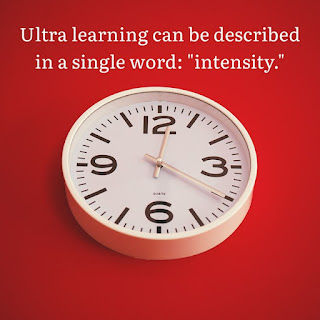Ultralearning| Master Hard Skills, Outsmart the Competition, and Accelerate Your Career Book by Scott Young|summary and keypoints
"The first step in learning is to research and draw a map of "what resources are available." Spend 10% of your total learning time to research every time you start learning something.
Ultra learning can be described in a single word: "intensity."
Scott Young learned four different languages in four different countries - Spain, Brazil, Korea, and China - in 12 months, spending three months in each country. He did not speak a single word in English, not even with his friend who was traveling with him, and not during phone calls. The ultra-learning phase is different from other methods due to its intensity and self-directed nature.
Before starting or even during the learning process, you can spend 10% of your time researching resources to identify those that are concise and to the point.
Learn something by doing it, by solving real-life problems. Learn directly from the source.
Learning something new boosts your confidence because now you know you can do something you couldn't do before.
Ultra learning differs from traditional classroom studies because it involves delving deeper and deeper into the subject matter, ultimately leading to mastery and speed.
Spend time recalling a topic, bring all the concepts to mind, and even test what you've remembered. This way, when you start reading, ideas and information about that topic will come to mind automatically.
After writing, check what you remembered and what you forgot.
The more you know about something, the more connections you can make with other topics.
Directness:
Learn things in the context in which they are applied. For example, if you want to learn a language, practice speaking it. If you want to learn programming, create practical applications. Learn skills by applying them to your projects.
Learn writing by writing, coding by coding, and appreciate beauty by engaging with it directly.
In theory, we might think that practical applications align with theory, but in practice, they often differ. Get as close as possible to the physical aspect of what you're learning.
Monitor what you forget and try to understand why it happened. Understand the philosophy behind things. Deep knowledge about a topic is achieved through understanding its first principles.
Remember to memorize things for the long term, not just for the moment.
Challenge your memory and understanding by taking tests. Testing transforms theoretical knowledge into practical understanding.
When you're learning something, keep the end goal in mind or get as close to it as possible. For example, if you want to learn coding to create a video editing app, start coding using video editing techniques.
Copying others can reduce cognitive load, and retrieval practice prepares you for future ideas even when there's nothing apparent to retrieve. Memory is the result of thought.
Learning from experts is highly beneficial. Ask an expert for just 15 minutes to help you in your learning. Don't ask for more time in the first meeting; if they are pleased with your approach, they may offer more guidance. Look for common methods used by experts to learn.
Curing procrastination:
If your current task feels boring, and you're tempted to do something else, take a moment to reflect on the difference between the two tasks. Start with the more interesting task for a while, then pause and reflect on the distinctions.



Comments
Post a Comment